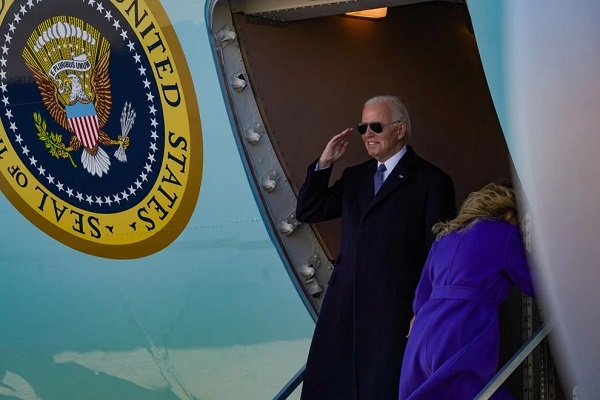Uncategorized
American on deadly trip to Indian island: ‘God sheltered me’

NEW DELHI — The young American, paddling his kayak toward a remote Indian island whose people have resisted the outside world for thousands of years, believed God was helping him dodge the authorities.
“God sheltered me and camouflaged me against the coast guard and the navy,” John Allen Chau wrote before he was killed last week on North Sentinel Island. Indian ships monitor the waters around the island, trying to ensure outsiders do not go near the Sentinelese, who have repeatedly made clear they want to be left alone.
When a young boy tried to hit him with an arrow on his first day on the island, Chau swam back to the fishing boat he’d arranged to wait for him off shore. The arrow, he wrote, hit a Bible he was carrying.
“Why did a little kid have to shoot me today?” he wrote in his notes, which he left with the fishermen before swimming back the next morning. “His high-pitched voice still lingers in my head.”
Police say Chau knew that the Sentinelese resisted all contact by outsiders, firing arrows and spears at passing helicopters and killing fishermen who drift onto their shore. His notes, which were reported Thursday in Indian newspapers and confirmed by police, make clear he knew he might be killed.
“I DON’T WANT TO DIE,” wrote Chau, who appeared to want to bring Christianity to the islanders. “Would it be wiser to leave and let someone else to continue. No I don’t think so.”
Indian authorities have been trying to figure out a way to recover Chau’s body after he was killed last week by islanders who apparently shot him with arrows and then buried his body on the beach.
Even officials don’t travel to North Sentinel, where people live as their ancestors did thousands of years ago. The only contacts, occasional “gift-giving” visits in which bananas and coconuts were passed by small teams of officials and scholars who remained in the surf, were years ago.
Police are consulting anthropologists, tribal welfare experts and scholars to figure out a way to recover the body, Dependera Pathak, director-general of police on India’s Andaman and Nicobar Islands, where North Sentinel is located, said Thursday.
Chau paid fishermen last week to take him near North Sentinel, using the kayak to paddle to shore and bringing gifts including a football and fish.
Scholars know almost nothing about the island, from how many people live there to what language they speak. The Andamans once had other similar groups, long-ago migrants from Africa and Southeast Asia who settled in the island chain, but their numbers have dwindled dramatically over the past century as a result of disease, intermarriage and migration.
Chau estimated there were about 250 inhabitants on the island, with at least 10 people living in each hut.
“The tribe’s language has a lot of high pitched sounds like ba, pa la and as,” he wrote.
It’s not clear what happened to Chau when he swam back to the island the next morning. But on the morning of the following day, the fishermen watched from the boat as tribesmen dragged Chau’s body along the beach and buried his remains.
Seven people have been arrested for helping Chau, including five fishermen, a friend of Chau’s and a local tourist guide, police say.
In an Instagram post, his family said it was mourning him as a “beloved son, brother, uncle and best friend to us.” The family also said it forgave his killers.
Authorities say Chau arrived in the area on Oct. 16 and stayed on another island while he prepared to travel to North Sentinel. It was not his first time in the region: he had visited the Andaman islands in 2015 and 2016.
With help from the friend, Chau paid fishermen $325 to take him there, Pathak said.
After the fishermen realized Chau had been killed, they left for Port Blair, the capital of the island chain, where they broke the news to Chau’s friend, who notified his family, Pathak said.
Police surveyed the island by air Tuesday, and a team of police and forest department officials used a coast guard boat to travel there Wednesday. It was not clear if they have returned since then.
Chau, whose friends described him as a fervent Christian, attended Oral Roberts University in Tulsa, Oklahoma. Before that he had lived in southwestern Washington state and went to Vancouver Christian High School.
___
Associated Press writer Tim Sullivan contributed to this report.
Ashok Sharma, The Associated Press
Uncategorized
Kananaskis G7 meeting the right setting for U.S. and Canada to reassert energy ties


Energy security, resilience and affordability have long been protected by a continentally integrated energy sector.
The G7 summit in Kananaskis, Alberta, offers a key platform to reassert how North American energy cooperation has made the U.S. and Canada stronger, according to a joint statement from The Heritage Foundation, the foremost American conservative think tank, and MEI, a pan-Canadian research and educational policy organization.
“Energy cooperation between Canada, Mexico and the United States is vital for the Western World’s energy security,” says Diana Furchtgott-Roth, director of the Center for Energy, Climate and Environment and the Herbert and Joyce Morgan Fellow at the Heritage Foundation, and one of America’s most prominent energy experts. “Both President Trump and Prime Minister Carney share energy as a key priority for their respective administrations.
She added, “The G7 should embrace energy abundance by cooperating and committing to a rapid expansion of energy infrastructure. Members should commit to streamlined permitting, including a one-stop shop permitting and environmental review process, to unleash the capital investment necessary to make energy abundance a reality.”
North America’s energy industry is continentally integrated, benefitting from a blend of U.S. light crude oil and Mexican and Canadian heavy crude oil that keeps the continent’s refineries running smoothly.
Each day, Canada exports 2.8 million barrels of oil to the United States.
These get refined into gasoline, diesel and other higher value-added products that furnish the U.S. market with reliable and affordable energy, as well as exported to other countries, including some 780,000 barrels per day of finished products that get exported to Canada and 1.08 million barrels per day to Mexico.
A similar situation occurs with natural gas, where Canada ships 8.7 billion cubic feet of natural gas per day to the United States through a continental network of pipelines.
This gets consumed by U.S. households, as well as transformed into liquefied natural gas products, of which the United States exports 11.5 billion cubic feet per day, mostly from ports in Louisiana, Texas and Maryland.
“The abundance and complementarity of Canada and the United States’ energy resources have made both nations more prosperous and more secure in their supply,” says Daniel Dufort, president and CEO of the MEI. “Both countries stand to reduce dependence on Chinese and Russian energy by expanding their pipeline networks – the United States to the East and Canada to the West – to supply their European and Asian allies in an increasingly turbulent world.”
Under this scenario, Europe would buy more high-value light oil from the U.S., whose domestic needs would be back-stopped by lower-priced heavy oil imports from Canada, whereas Asia would consume more LNG from Canada, diminishing China and Russia’s economic and strategic leverage over it.
* * *
The MEI is an independent public policy think tank with offices in Montreal, Ottawa, and Calgary. Through its publications, media appearances, and advisory services to policymakers, the MEI stimulates public policy debate and reforms based on sound economics and entrepreneurship.
As the nation’s largest, most broadly supported conservative research and educational institution, The Heritage Foundation has been leading the American conservative movement since our founding in 1973. The Heritage Foundation reaches more than 10 million members, advocates, and concerned Americans every day with information on critical issues facing America.
Uncategorized
Poilievre on 2025 Election Interference – Carney sill hasn’t fired Liberal MP in Chinese election interference scandal

From Conservative Party Communications
“Yes. He must be disqualified. I find it incredible that Mark Carney would allow someone to run for his party that called for a Canadian citizen to be handed over to a foreign government on a bounty, a foreign government that would almost certainly execute that Canadian citizen.
“Think about that for a second. We have a Liberal MP saying that a Canadian citizen should be handed over to a foreign dictatorship to get a bounty so that that citizen could be murdered. And Mark Carney says he should stay on as a candidate. What does that say about whether Mark Carney would protect Canadians?
“Mark Carney is deeply conflicted. Just in November, he went to Beijing and secured a quarter-billion-dollar loan for his company from a state-owned Chinese bank. He’s deeply compromised, and he will never stand up for Canada against any foreign regime. It is another reason why Mr. Carney must show us all his assets, all the money he owes, all the money that his companies owe to foreign hostile regimes. And this story might not be entirely the story of the bounty, and a Liberal MP calling for a Canadian to be handed over for execution to a foreign government might not be something that the everyday Canadian can relate to because it’s so outrageous. But I ask you this, if Mark Carney would allow his Liberal MP to make a comment like this, when would he ever protect Canada or Canadians against foreign hostility?
“He has never put Canada first, and that’s why we cannot have a fourth Liberal term. After the Lost Liberal Decade, our country is a playground for foreign interference. Our economy is weaker than ever before. Our people more divided. We need a change to put Canada first with a new government that will stand up for the security and economy of our citizens and take back control of our destiny. Let’s bring it home.”
-

 Alberta21 hours ago
Alberta21 hours agoUnified message for Ottawa: Premier Danielle Smith and Premier Scott Moe call for change to federal policies
-

 Alberta2 days ago
Alberta2 days agoCentral Alberta MP resigns to give Conservative leader Pierre Poilievre a chance to regain a seat in Parliament
-

 Alberta2 days ago
Alberta2 days agoAlberta health care blockbuster: Province eliminating AHS Health Zones in favour of local decision-making!
-

 Daily Caller2 days ago
Daily Caller2 days ago‘Not Held Hostage Anymore’: Economist Explains How America Benefits If Trump Gets Oil And Gas Expansion
-

 Alberta2 days ago
Alberta2 days agoAlberta pro-life group says health officials admit many babies are left to die after failed abortions
-

 Business20 hours ago
Business20 hours agoCanada’s critical minerals are key to negotiating with Trump
-

 International13 hours ago
International13 hours agoJudiciary explores accountability options over Biden decline ‘coverup’
-

 Alberta1 day ago
Alberta1 day agoCalls for a new pipeline to the coast are only getting louder






